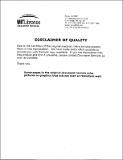Identification and characterization of GRP50 : a novel Golgi-associated ankyrin repeat protein
Author(s)
Maxwell, Michele Marie, 1968-
DownloadFull printable version (11.68Mb)
Other Contributors
Massachusetts Institute of Technology. Dept. of Biology.
Advisor
David E. Housman.
Terms of use
Metadata
Show full item recordAbstract
This thesis describes the identification and characterization of a novel gene, GRP50 (Golgi-associated ankyrin repeat protein of 50 kilodaltons), which encodes a highly conserved mammalian protein exhibiting a unique structural architecture. Homology searching tools reveal that no known orthologues of this protein have been identified in other species, indicating that it is not a member of a previously characterized family. GRP50 is abundantly expressed in fetal tissues and in adult brain, and is induced as part of the serum response in cultured primary fibroblasts. Sequence analysis indicates that GRP50 encodes a medium-sized protein with multiple modular domains, including an ankyrin repeat region, a polyproline-rich region, and a leucine-rich region that may form c-helical coiled coils. Each of these domains has been shown in other proteins to function as a protein-protein interaction module. We have used immunolocalization techniques to show that GRP50 is peripherally associated with the cytoplasmic face of Golgi and vesicle membranes in cultured mammalian fibroblasts. Further, we have demonstrated that Golgi-association of GRP50 is sensitive to the effects of the fungal metabolite, Brefeldin A. In biochemical fractionation experiments, GRP50 was purified from cultured cells as part of a large macromolecular complex. The possible roles of GRP50 in biological events at the cytoplasmic face of Golgi and vesicle membranes are discussed.
Description
Thesis (Ph. D.)--Massachusetts Institute of Technology, Dept. of Biology, 2002. Includes bibliographical references.
Date issued
2002Department
Massachusetts Institute of Technology. Department of BiologyPublisher
Massachusetts Institute of Technology
Keywords
Biology.